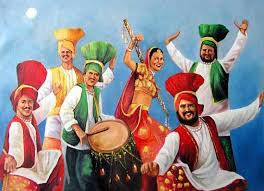 India is a land of festivals.There are hundreds of festivals celebrated in different parts of country by people of different religions.Each festival has its unique way of celebration,importance.message,time and background story for the celebration.Among them one of the major festival is Baisakhi. Baisakhi festival is Celebrated every year on 13th April and the grand celebration in Punjab.Baisakhi is also the time for the harvest of the crops in the northern part of India. The farmers are the most joyous group this day and most of them celebrate by praying to the almighty first thing in the morning, which is followed by a visit to the Baisakhi Fairs.Farmers, especially in Punjab and Haryana, express their gratitude for a good harvest and pray for prosperity in the coming year. Usually, this includes waking up early to take a dip in holy water, wearing colourful clothes, and dancing.Many also take bath in the holy river to mark the auspicious occasion. After getting ready people pay a visit to their neighbourdood gurdwara and take part in the special prayer meeting organized for the day. At the end of the Baisakhi ardas, congregates receive specially prepared Kara prasad or sweetened semolina. This is followed by a guru ka langar or community lunch.
India is a land of festivals.There are hundreds of festivals celebrated in different parts of country by people of different religions.Each festival has its unique way of celebration,importance.message,time and background story for the celebration.Among them one of the major festival is Baisakhi. Baisakhi festival is Celebrated every year on 13th April and the grand celebration in Punjab.Baisakhi is also the time for the harvest of the crops in the northern part of India. The farmers are the most joyous group this day and most of them celebrate by praying to the almighty first thing in the morning, which is followed by a visit to the Baisakhi Fairs.Farmers, especially in Punjab and Haryana, express their gratitude for a good harvest and pray for prosperity in the coming year. Usually, this includes waking up early to take a dip in holy water, wearing colourful clothes, and dancing.Many also take bath in the holy river to mark the auspicious occasion. After getting ready people pay a visit to their neighbourdood gurdwara and take part in the special prayer meeting organized for the day. At the end of the Baisakhi ardas, congregates receive specially prepared Kara prasad or sweetened semolina. This is followed by a guru ka langar or community lunch. 
Later, during the day people of Sikh faith take out a Baisakhi procession under the leadership of Panj piaras. The procession moves through the major localities of the city amidst the rendition of devotional songs by the participating men, women and children. Mock duels, bhangra and gidda performances make the procession joyous and colourful. It is also the day of the Punjabi new year. As the festival has tremendous importance in Sikh religion, major activities of the day are organized in Gurdwaras.
Baisakhi Celebration in Golden Temple
The most famous of them all in the Golden Temple which was founded by the fourth Guru of Sikhs, Guru Ramdas and completed by his successor Guru Arjan Dev. On Baisakhi day, water is drawn from all the sacred rivers of India and poured in to the huge tank surrounding the golden temple.
Baisakhi Celebration in Assam
In Assam, this is the day for the Rongali Bihu, which is a chance for the young people of the state to dress up in their traditional finery and dance the night away. There too, this is the harvest festival, which allows the farmers to relax and enjoy before they take up the task of harvesting their crop.
Baisakhi Celebration in Bihar
The Bihar State celebrates festivals like - the Vaishakha (April) and Kartika (November) in honor of the Sun God and Surya God, at a place called Surajpur-Baragaon. This is essentially a village where, according to an ancient practice, people bathe in the temple tank and pay obeisance to the Sun God while offering flowers and water from the sacred river Ganga.
Baisakhi Celebration in Himachal Pradesh
Baisakhi festival is celebrated twice a year in Himachal Pradesh in the honor of Goddess Jwalamukhi. In the months of Vaishakha (April-May) and Kartika (November), the Himachalis worship the Goddess whose image near a hot spring issues forth flames.
Baisakhi Celebration in Kerala(Southern state)
Baisakhi is Known as Vishu.Baisakhi festival is celebrated with vigour and fanfare across the southern state of Kerala. It is revered as a festival of fireworks, light and colour. usually people keep a mirror with lot of colourful fruits, vegetables and pulses celebrating the good harvest and pray for a successful year ahead. Elders give the youngsters Vishu Kai neettam, which could be just a small rupee coin or something even more extravagant. Yet the simple act of receiving from the elders sends the children in a tizzy and they enjoy their Vishu very well. People from Kerala prepare a Sadhya, which is a sumptuous feast with fruits vegetables, and enjoy with the family. The Vishu flower is the Konna Poo or the Cassia Fistula, which is the scientific name and is predominantly kept along with the other things in front of the mirror. Children get up early in the morning and are taken to see the spread in the front of the mirror.



